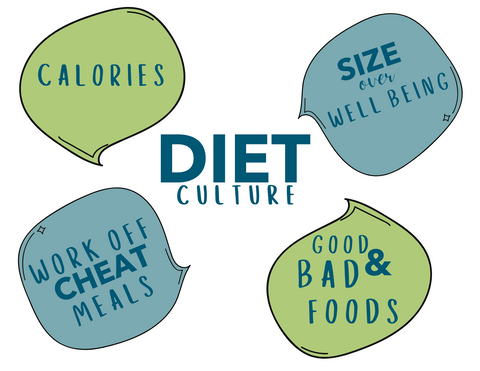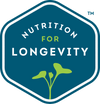What Is Diet Culture?
Diet Culture. We're starting to hear this buzz word more and more, but what is it?

Diet culture isn't just “being on a diet”. You can follow an infinite amount of diets to be caught up in the culture of dieting. As a disclaimer, there are very specific diets needed for medical reasons (i.e., celiac disease) in which you have to "diet" but can avoid being engaged in "diet" culture.
Diet culture embraces the ideology that women must be thin and men must be muscular. This belief has influenced our eating habits, how we act, and has prohibited many of us from living our lives to the fullest. Diet culture assumes that eating in a certain way will result in the right body size or the ‘correct’ body size and that it's attainable for anybody who has the "right" mindset. But, this isn't true. There's a reason that 98% of diets fail.
Diet culture sets us up to feel bad about ourselves (and judge other people, too), while hinting that losing weight will help us feel better without acknowledging our health or well-being. If you think this isn't a systemic problem, you're wrong. Diet culture is everywhere. According to a 2008 survey conducted by University of North Carolina of 4,023 women between the ages of 25–45 years of age:
- 75 percent of women reported disordered eating behaviors or symptoms consistent with eating disorders.
- 53 percent of dieters are already at a healthy weight and are still trying to lose weight.
- 39 percent of women say concerns about what they eat or weigh interfere with their happiness.
- 27 percent would be “extremely upset” if they gained just five pounds.
75% of females [from this survey population] have reported disordered eating — this statistic is outrageous. So, what can we do to start some change?
Diet culture has formed a misconception of the word diet by attributing it to consuming certain foods that will promote weight loss. For example, consuming a salad is correlated to trying to lose weight, while eating carbohydrates are demonized and associated with weight gain.

In reality, diet actually refers to the foods you eat on a daily basis. The misuse of the word diet and beliefs surrounding the word has led individuals to turn to fad diets or “quick fixes”, like Keto, paleo, Atkins, Whole 30, which may lead to weight loss. These popular diets usually eliminate entire food groups from your diet or restrict calories, which makes it unsustainable, and most importantly may not promote weight loss as intended.
To promote optimal health and avoid unhealthy habits, we want to steer away from diet culture. Let it be known, that anti-diet does not mean anti-health or anti-nutrition. Anti-diet culture encourages and gives people resources to eat healthy and to move their bodies in a healthy way without having to tell people they must weigh a certain amount.
Here are a few dietitian tips for a healthy diet and lifestyle:
- Don’t compare yourself to people on social media: most pictures on Instagram and Facebook are edited to appear a certain way to meet societal standards. Keep in mind, social media doesn’t always equate to real life. Imitating or idealizing influencers on social media can lead to an unrealistic comparison and negative outlook on your body or self-image. Be confident, be real, and be you!
- Take your focus off the scale: the number on the scale is not an accurate representation of your health. Rather than obsessing about weight, talk to your doctor about keeping up with important labs, such as cholesterol, blood sugar, and blood pressure. Work closely with your healthcare team and registered dietitian to monitor your numbers and make necessary changes that optimize your health.
- Follow the science: don’t follow biased social media accounts that glorify unrealistic ideologies not supported by scientific evidence. Do your research and talk to a dietitian about any questions you might have!
- Make well-balanced choices: don’t eliminate food groups or start a fad diet. You can make healthy choices at home just by adding more nutritious vegetables and fruits to your meals. For example, the healthy meal plans offered at Nutrition for Longevity provide 6 servings of fruits and vegetables per day! Make more room on your plate for these healthy habits.
At N4L, we know staying away from diet culture can be extremely hard, especially with social media! As a final tip, focus on what makes you feel good, healthy, and promotes your health span. And get started with one of our meal plans, including our vegan meal plan, pescatarian meal plan, or our flexitarian meal plan.




